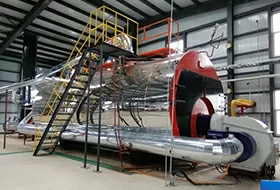
নভে. . 27, 2024 03:08 Back to list
Cost of Industrial Water Boilers and Factors Affecting Pricing
Understanding the Price Dynamics of Industrial Water Boilers
Industrial water boilers play a pivotal role across various sectors, including manufacturing, food processing, and energy production. These systems are essential for producing steam or hot water for a wide range of applications. When it comes to purchasing an industrial water boiler, understanding the price dynamics involved is crucial for making informed decisions.
Factors Influencing the Price of Industrial Water Boilers
1. Type of Boiler Industrial water boilers come in different types, including fire-tube, water-tube, electric, and biomass boilers. Each type has its specifications, advantages, and price points. For instance, fire-tube boilers are generally less expensive but may not be as efficient as water-tube boilers, which typically come at a higher price due to their design and efficiency.
2. Capacity The required capacity significantly influences the price. Industrial boilers are rated by their steam production capacity, often measured in pounds per hour (lb/h) or megawatts (MW). Higher capacity boilers are usually more expensive, as they require larger components, advanced technology, and stronger materials to handle the increased pressure and thermal loads.
3. Fuel Type The type of fuel that the boiler is designed to use affects its cost. Natural gas boilers might be cheaper upfront compared to oil or biomass-fired boilers. However, operating costs, fuel availability, and efficiency should also be considered. Some industries now prefer electric boilers for their ease of use and environmental benefits, though they can be more expensive to install initially.
4. Efficiency Ratings The efficiency of a boiler, typically expressed in terms of Annual Fuel Utilization Efficiency (AFUE), impacts both the purchase price and operational costs. High-efficiency boilers usually require more advanced technology, which can raise the initial price. However, the long-term savings on fuel bills can justify the higher upfront investment.
5. Custom Features and Automation Some businesses require tailored features such as advanced monitoring systems, enhanced safety controls, or automatic operation capabilities. Custom features can significantly drive up the price of a boiler. Investing in these technologies may enhance operational efficiency and safety, but it’s essential to weigh these benefits against the additional costs.
industrial water boiler price

6. Brand and Manufacturer The brand reputation and the manufacturer’s expertise also play a role in determining the price of industrial water boilers. Renowned brands may charge a premium due to their quality assurance, warranty, and customer service.
7. Regulatory Compliance Compliance with local environmental regulations can influence boiler design and price. Higher emissions standards may necessitate additional technology, increasing the cost of the unit. Industries must ensure that their equipment meets these regulations, which may also involve ongoing testing and maintenance costs.
Average Price Ranges
While prices can vary widely based on the factors mentioned above, industrial water boilers generally fall within the following price brackets
- Basic Fire-Tube Boilers These can range from $5,000 to $50,000, depending on capacity and features. - Water-Tube Boilers Typically range between $15,000 and $100,000 due to greater efficiency and capacity. - Electric Boilers The price may start at about $3,000 and can go upwards of $30,000. - Biomass Boilers These systems often range from $20,000 to $100,000, reflecting the complexity of their design and fuel handling requirements.
Conclusion
Investing in an industrial water boiler is a significant decision that requires careful consideration of various factors that influence pricing. From the type and capacity of the boiler to efficiency ratings and regulatory requirements, each element plays a crucial role in determining the final cost. While initial purchase price is important, businesses should also consider long-term operating costs, maintenance, and potential energy savings. Evaluating all these aspects will help industries choose the right boiler that not only fits their budget but also aligns with their operational needs and sustainability goals. As the market continues to evolve, understanding these price dynamics will be essential for making strategic purchasing decisions in the realm of industrial water boilers.
-
Efficient Biomass Fired Hot Water Boiler | AI Heating Solution
NewsAug.01,2025
-
High-Efficiency Gas Thermal Oil Boilers | HPT Models
NewsJul.31,2025
-
Oil Fired Hot Water Boilers Sale - High Efficiency & Affordable
NewsJul.31,2025
-
High-Efficiency Commercial Oil Fired Steam Boiler for Industry
NewsJul.30,2025
-
High-Efficiency Biomass Fired Thermal Oil Boiler Solutions
NewsJul.30,2025
-
High Efficiency Gas Fired Thermal Oil Boiler for Industrial Heating
NewsJul.29,2025
Related PRODUCTS






















